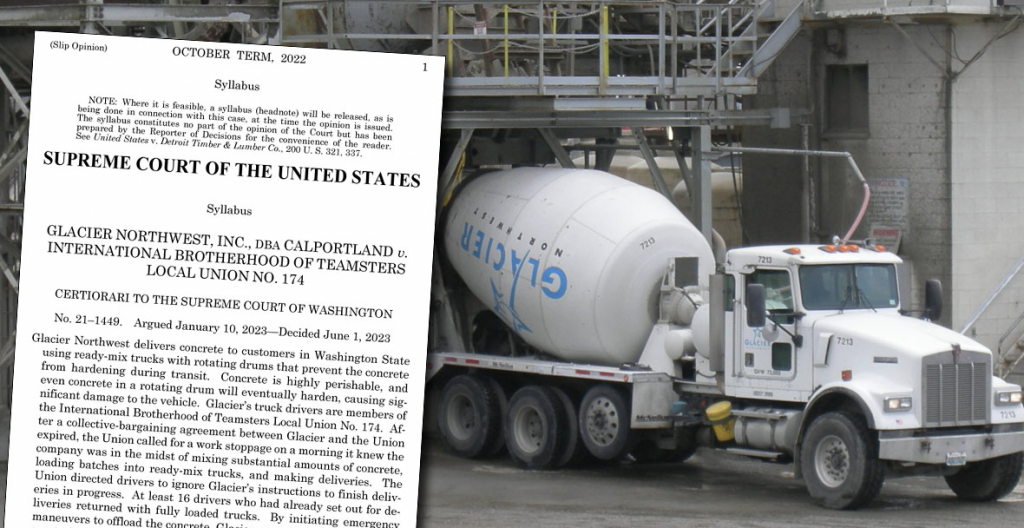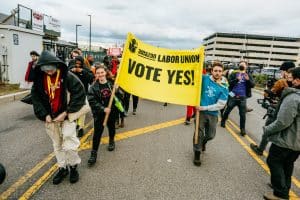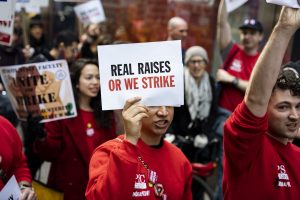Thursday morning, the Supreme Court ruled 8-1 in favor of the employer in Glacier Northwest Inc v. Teamsters Local 174, sending the case back to Washington State court to be litigated.
In 2017, Teamsters truck drivers went on strike for eight days after negotiations stalled. Before participating in the strike, the truck drivers brought back the concrete trucks to the company’s premises.
But the company alleged that the union “intentionally destroyed the company’s concrete,” accusing the union of coordinating with truck drivers to not deliver the ready-mix concrete loaded in their trucks and provoking a major loss for the company.
The Supreme Court Decision
The Supreme Court based its decision on the limitation on the right to strike expressed by the NLRA: “The National Labor Relations Board has long taken the position—which the parties accept—that the NLRA does not shield strikers who fail to take ‘reasonable precautions’ to protect their employer’s property from foreseeable, aggravated, and imminent danger due to the sudden cessation of work.”
Under that framework, the Supreme Court stated that:
The Union knew that concrete is highly perishable, that it can last for only a limited time in a delivery truck’s rotating drum, and that concrete left to harden in a truck’s drum causes significant damage to the truck. The Union nevertheless coordinated with truck drivers to initiate the strike when Glacier was in the midst of batching large quantities of concrete and delivering it to customers. The resulting risk of harm to Glacier’s equipment and destruction of its concrete were both foreseeable and serious. The Union thus failed to ‘take reasonable precautions to protect’ against this foreseeable and imminent danger. Bethany Medical Center, 328 N. L. R. B., at 1094. Indeed, far from taking reasonable precautions, the Union executed the strike in a manner designed to achieve those results. Because such conduct is not arguably protected by the NLRA, the state court erred in dismissing Glacier’s tort claims as preempted.
According to the San Diego Trades Council v. Garmon (1959) case, when a labor union or an employer is involved in an activity that could potentially be protected under the law, the National Labor Relations Board (NLRB) must first determine whether the activity is indeed protected.
If the NLRB determines that a union’s actions fall within its legal rights, Garmon establishes that “the matter is concluded, and the states are deprived of any authority.” On the other hand, if the NLRB determines that federal labor law does not protect the union’s actions, the employer can then pursue legal action against the union in a state court.
The Supreme Court created the scenario for the state court to decide against the Teamsters, enabling the company to sue them and establish a negative precedent towards the right to strike.
This Is Not an Isolated Case
The NLRB itself has already ordered the United Mine Workers of America (UMWA) to pay 13.3 million to Warrior Met Coal for damages during the strike. The argument in that case was not only about lost production because of the strike, but included reimbursements for security guards, security cameras, repairs, and buses for carrying scabs across picket lines.
When DHL Teamsters from Local 251 went on strike last year in Providence, RI, cops attacked the picket lines and arrested union leaders in an attempt to break the strike.
Last summer, negotiations between the railroad companies and the railroad unions stalled due to the intransigence of the employers The railroads are governed by the Railway Labor Act rather than the National Labor Relations Act, which empowers Congress to intervene in negotiations in the event of an impasse. President Joe Biden, at the express request of the railroad companies and the bosses, created through Executive Order a Presidential Emergency Board (PEB) to intervene in the negotiations. Later the Congress imposed a tentative agreement to the railroad workers who had voted in favor of going on strike to meet their demands.
The Right To Strike
Striking is the most powerful weapon of the workers. When workers withhold their labor, they are showing who actually runs the workplace. One of the concrete goals of a strike is to make a corporation have an economic loss and force them to concede in a negotiation. Without the possibility of disrupting the business of a corporation, the strike loses any kind of purpose or power.
It is not a coincidence that this comes in a moment where unions have massive support among the general population and there is a new energy in the workers’ movement. Our working conditions and wages have been eroded by economic crises, the pandemic, high inflation, and profit-thirsty corporations. And we are fighting back.
Workers at companies like Amazon, Starbucks, Apple,Trader Joe’s, and many others are fighting to unionize their workplaces and get a first contract. In other sectors, like education, healthcare, manufacturing and more, workers are going on strike to fight for better.
And this particular attack against the Teamsters is coming when we are two months away from the UPS-Teamster contract expiration and the possible strike on August 1 if the demands are not met. UPS is a giant corporation; the 15 days strike of 1997 made them lose $536 millions in profits, and today, a two week strike could mean $3.2 billion loss in profits.
The Power is in Our Collective Action
The Supreme Court, which recently didn’t hesitate to take away the right for an abortion to millions of people, is now opening the door to further limit the ability to go on strike.
Whether it is Congress, the Supreme Court, or police repression, Democrats and Republicans will use all they can to attack workers and defend corporations. Furthermore, this case will also be used by bureaucratic unions to excuse themselves from taking more militant actions.
To revive the labor movement and win meaningful gains, we need fighting unions that are led by rank-and-file workers and trust in the collective strength of workers. It is essential to increase the involvement of rank-and-file workers, and for workers to develop democratic shop-floor organizations where they can discuss how to organize their strikes and other types of collective actions.
With an economic recession in sight, corporations will not cede their profits and will try to continue making us pay the costs of the economic crises. We have to be ready to challenge their profits, to prepare strikes with hard picket lines that will make our power much more effective, to reject any kind of judge injunction against our protests, to prevent scabs taking our jobs and keep business running, defy anti-strike laws, and so on.
This decision is outrageous. We have to fight back to defend our right to protest and to strike.











